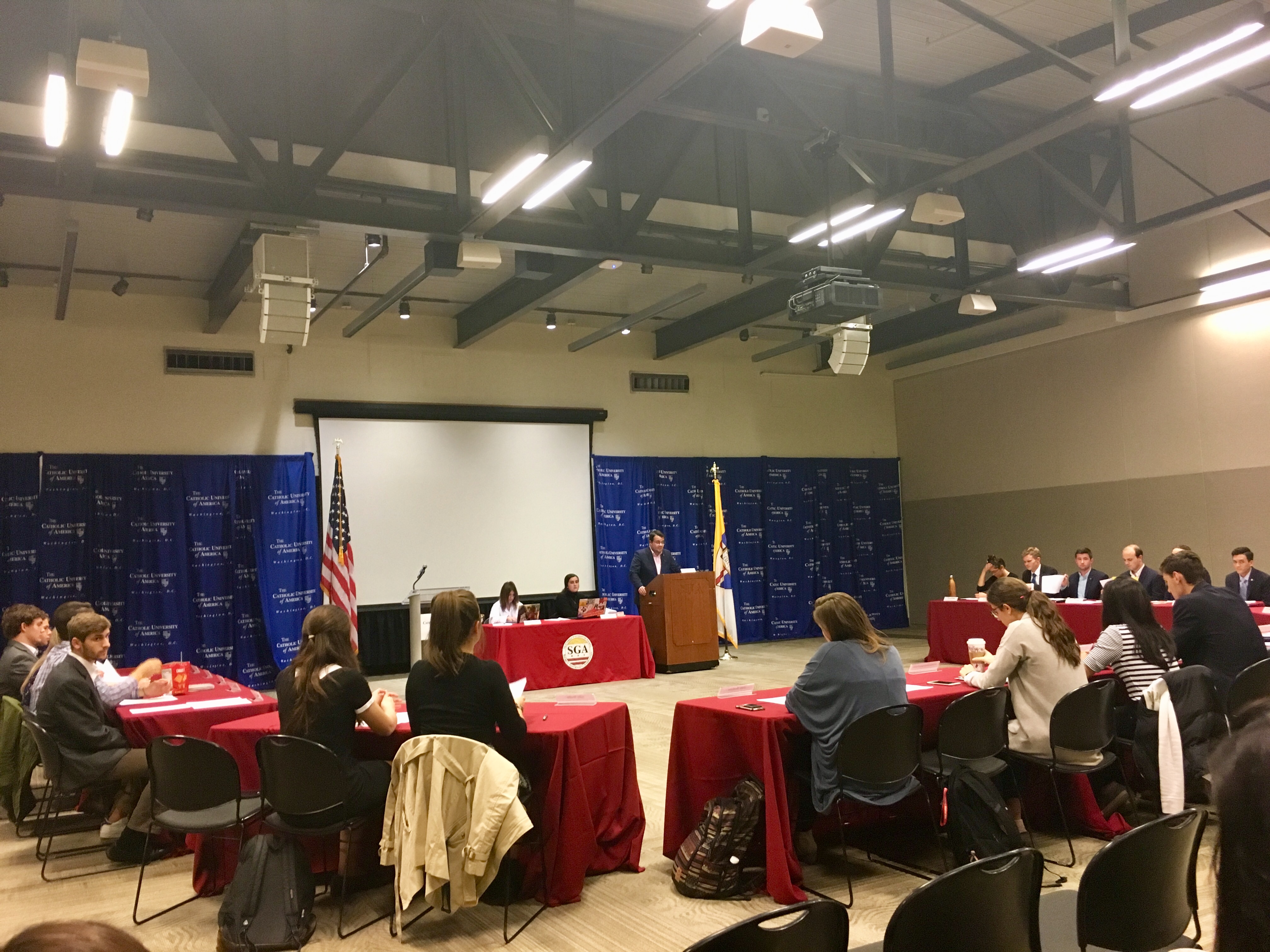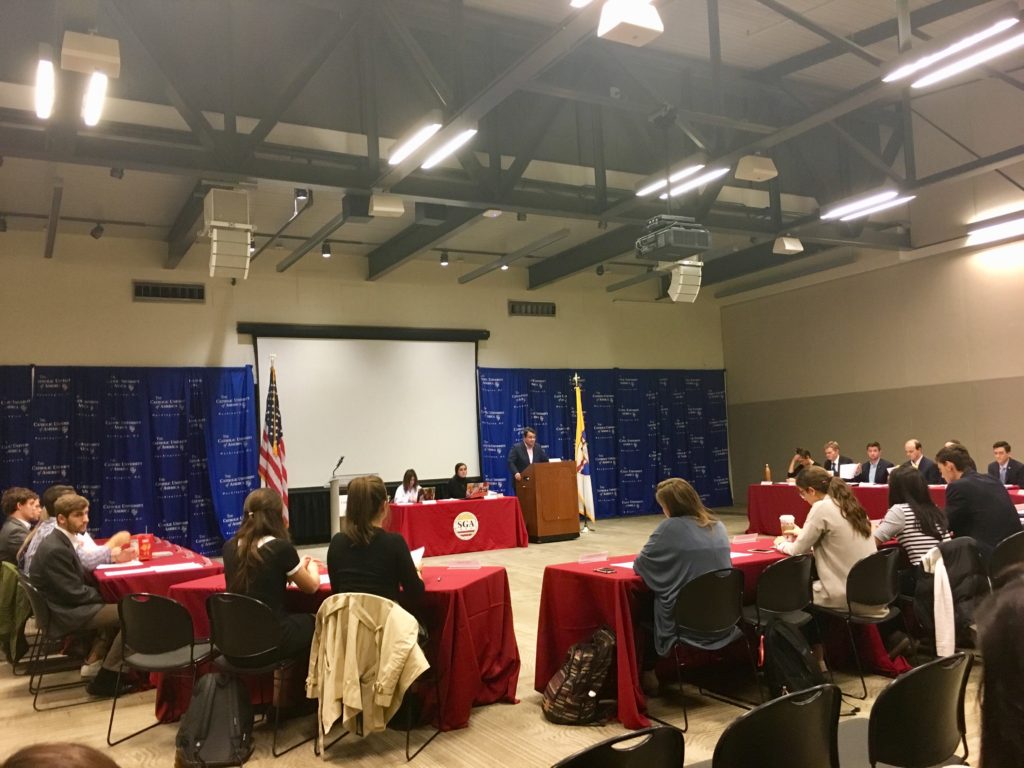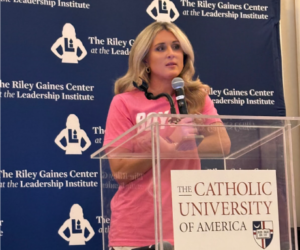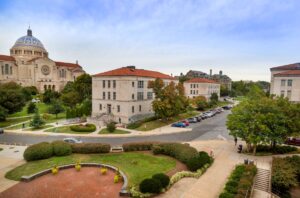SGA Senate Takes Stances on Academic Proposal, Tuition Increases at Meeting

The Senate debates the Academic Renewal proposal. Courtesy of Katie Ward

By Katie Ward
In the Senate’s eighth meeting of the academic year last Monday, March 26th, three resolutions were proposed regarding sustainable mentoring programs in different disciplines, a statement on the proposed Academic Renewal plan, and a tuition guarantee plan for the university.
The meeting opened with its usual public comment, during which several Media and Communication Studies majors spoke of their disapproval of the Academic Renewal proposal which was first sent out to students by Senate President Jon Paul Weiss on March 15th.
The proposal, which includes the movement of the department of Media and Communication Studies from the School of Arts and Sciences to a new School of Music, Visual, and Performing Arts, is to be voted upon on May 9th by the Academic Senate, on which three SGA members sit.
The students expressed concerns about a decreased faculty and staff in an already small department, and about the “completely different marketability of a degree” that would come from a degree from an arts school, according to junior media major Andrew Morgan.
Senior media major Jennifer Brown also expressed reservations about students applying for post-graduation jobs with resumes that note graduation from an arts school.
“I asked an employer what he would think if he saw on my resume “school of arts,” Brown said. “And he said that to me, ‘I would literally just think that you paint, dance, and sing, I don’t think of journalism, consulting, PR, marketing.’”
The concerns of the students were supported by Resolution 016, sponsored by Aaron Mackisey and co-sponsored by the heads of every Senate committee and both senators representing the School of Arts and Sciences. Resolution 016 proposed an amendment to the Academic Renewal proposal so that the department of Media and Communication Studies stay in the School of Arts and Sciences while the other three majors involved still combine to create a new School of Music, Visual, and Performing Arts.
All the co-sponsors of the resolution took a turn in expressing their support of the resolution, an amended Academic Renewal proposal, and all the Media and Communication Studies students. Multiple senators commended all the media students for their immediate action to promote their opinions and protect their department, praising what freshman Ally Kilgore called “democracy in action”.
“I ask this body not just for support but for a unanimity,” said junior Jimmy Harrington to the senate body. “Stand up for those who elected you.”
“None of us here in this body are Media and Communication Studies majors,” said junior John Connolly. “So, really, we are all going to be fine. But if this plan goes through, a lot of students are going to be affected in a very negative way.”
The resolution was voted for by twenty senators and will move to SGA President Brianna Howard’s desk to be signed.
Sophomore Elise LaFleur sponsored Resolution 015, which proposed the implementation of sustainable mentoring programs in more majors.
LaFleur noted that many schools and majors, including the Schools of Theology and Religious Studies, Nursing, Social Service, and Philosophy, lack sustainable mentoring programs, programs that won’t “fizzle out or change from year to year”.
“If the whole reason of going to college, besides getting a degree, is to make connections and learning from others who have been where you are now, why not encourage academic departments and those who have the resources to put this in place, to do so?” she asked the senate. LaFleur worked with President Howard the past year to create a mentoring program between upperclassmen and underclassmen in the politics department.
Leigh Calotta, who represents the School of Nursing, voiced her support for the resolution, saying that it would be a great resource for freshmen nursing majors to have an upperclassmen to advise them on classes, textbooks, and buying scrubs. The resolution received no opposition and was passed unanimously.
The last resolution of the night was proposed by Nicholas Spinelli of the Busch School of Business and Economics, and proposed a limit to tuition increases at the university.
“I’d like to take this time to congratulate all the juniors in the room who are going to be seniors next year,” Spinelli said in an opening to his presentation. “In the time you’ve been at CUA, the tuition has been increased by 11.3 percent.”
Spinelli stated that although national inflation has risen a little more than two percent since 2000, in the past three years at Catholic University, tuition has risen 3.8%, 3.6%, and 3.9%, respectively. He also noted that in the letter sent out from President Garvey to students regarding the most recent tuition hike, Garvey cited several campus projects and renovations that needed funding. Spinelli expressed his confusion at President Garvey’s sentiment, because according to him, most of those projects were funded by donations, and shouldn’t require students to help fund.
“If you’re sick and tired of your tuition going up and not seeing that value added back into your education, then you need to say something,” Spinelli said.
Spinelli proposed the resolution to receive feedback from the Senate on the tuition limit plan, but ultimately intended for it to be sent back to committee for finalization.
Several senators expressed doubts at the possibility of the resolution being adopted by the administration without more evidence of where the difference of funds would then come from.
“I don’t believe it would be fiscally responsible at this time to pose such an idea and lock our tuition if we’re already financial unstable,” said Hagerty, mentioning that a tuition guarantee program might work at public universities or private universities with larger endowments.
“I think the University is probably not going to be receptive of this, this has to be integrated into the University in a way that it will not lose money,” advised Connolly. “And I don’t really see how it will not lose money with this program.”
Spinelli acknowledged these concerns, and assured the Senate that he would provide more evidence with an updated resolution proposed in the future.
President Weiss provided updates on Resolution 09, to require the university to notify students ten business days in advance of a class cancellation, and Resolution 10, to keep classes from administering tests during the last class before finals. Both were signed by President Howard and approved by the administration for next year.
At the beginning of the meeting, freshman Raquel Garcia was nominated, and approved, to fill the vacant spot in the School of Social Work. There is still a vacant spot in a seat representing the School of Philosophy.
The next Senate meeting will be held on Monday, April 9th at 8 PM.







